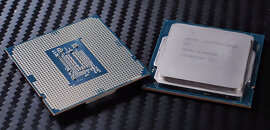Tuesday, March 2nd 2021

Intel Kills Extended Warranty Program for Overclocking
Some time ago, Intel has introduced the Performance Tuning Protection Plan (PTPP), which was used as a warranty for any damage that has occurred during overclocking. Customers of PTPP, mainly buyers of Intel Core processors having a "K" tag were able to get a replacement processor whenever they damaged their CPU by overclocking it. When it comes to the pricing of such a service, typical plans were spanning from $19.99 to $29.99, depending on the processor you had. However, there will no longer be such a program, as Intel is discontinuing its PTPP extended overclocking warranty. The company has updated its site to refer to End-Of-Life (EOL) page displaying a quote below.
Source:
Intel
Intel PTPP WebsiteTo PTPP Customers,
The Performance Tuning Protection Plan program has been discontinued.
As customers increasingly overclock with confidence, we are seeing lower demand for the Performance Tuning Protection Plans (PTPP).
As a result, Intel will no longer offer new PTPP plans effective March 1, 2021.
Intel will continue focusing on delivering amazing processors with tuning flexibility and overclocking tools like Intel Performance Maximizer and Intel XTU.
All existing plans will continue to be honored through the duration of the processor warranty period.
For questions, contact Intel Customer Support.
Note about the Intel Xeon W-3175X Processor
The Intel Xeon W-31 75X Processor is automatically covered for overclocking, No additional plan or activation code is required
Thank You,
PTPP Team

35 Comments on Intel Kills Extended Warranty Program for Overclocking
Surely, if AMD's stock was better, Intel would not be in a better state.
I imagine the program wasn't profitable enough for the overhead. Record-keeping, management, processors, and the like costing lots of money, while relatively few people signing up.
To be honest I feel that OC is kinda dead, the CPUs push themselves quite well, there is almost nothing left, gone are the days when we could really push the CPUs. If memory serves, I had an e4300 at 1.8ghz that could easily reach 3.0ghz.
nice....going....intel
Intel rma is fairly easy so doubt this is all that big of a deal.
If the chip doesn't have any physical damage on top or bottom and numbers match the box boom you're nearly done.
I love that part
Maybe I've been lucky but I just dont see dying CPUs as a concern for the common power user who pushes the OC a tiny bit.
cache hierachy errors, crashes ,reboots, unstable at stock speeds, USB Issues, NVME Issues, 50 billion bios updates to fix issues and when you remove the powerlimit they don't consume much less than a 10900K.
yeah the ipc bump is great but it's a complete mess of a hardware pre alpha.
Intel is a business in the business of making $$$, not CPUs, GPUs, desktops, laptops, etc. Their business is to make money, as is all businesses. If this was a profitable program, imagine a single executive giving the "OK" to end a profitable program? They wouldn't!
The one exception I can think of is if the resources required to run a still profitiable program were better suited for other uses. For ex, they profit $100K/month with this program, but if they axe it and move those resources to another program, the new program could be profiting $500K/month. So it would make more business sense to close the old program and put all resourses on the new one that is raking in the bigger bucks. Obviously I just pulled random numbers out my rear for the example! But the point is valid
I've seen performance degradation over time, probably due to electro migration but other than that, I think every single CPU I've overclocked would still run today. Heck I still have my trusty i7 2600K running at 4.5GHz in an emulation dedicated box in my house, in it's heyday that processor hit 5GHz at insane voltages while under water cooling, but now it's running at a much lower OC, I got that processor over 10 years ago and it's still chugging along!
The point I'm trying to make is, it would take some extreme OCing to kill a CPU, at least in my experience, idk the statistics, like Dave mentioned, the program probably wasn't even used that much.
That might be part of the reason Intel killed the program, but only someone with inside knowledge of the real numbers being this program, would be able to give us an answer.
That's all I can add from my own experience, anyone here ever made use of this program? I'm curious.
This implies that Intel has actually earned it when in fact Intel's windfall is more the result of demand being much higher than normal and AMD being completely out of stock.
AMD has held a majority of the top selling CPU spots at retailers worldwide throughout the pandemic. Intel selling CPUs when people have no choice but the least desirable product on the shelf, in this case Intel, is not something to be touted. The last thing Intel's marketing department needs is another way to spin a crappy situation.
My Ryzen 1600x literally gives me maybe 2fps more in games if I manually overclock it to 4ghz from the stock 3.6ghz (it will push the most utilized cores higher than 3.6ghz when needed anyway). The only real benefit is for synthetic benchmark scores and encoding..and making it hotter for cold winter days lol.